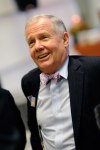The famous and renown philosopher of religion, Alvin Plantinga, when being asked about the problem of evil, started his response with reference to C.S. Lewis’ famous trilogy – The Cosmic Trilogy. Plantinga’s whole thesis lies on the subliminal message of Lewis – that Lewis was trying to explain the depravity of mankind covertly and secretly through a well written, exciting and interesting science fiction thriller. Whatever the case, this book is a classic read and typical of the moralist that Lewis is known to be.
The Space or Cosmic Trilogy was written by Lewis before he wrote the famous Chronicles of Narnia. It consists of three different books listed in order:
~ Out of The Silent Planet ~
~ Perelandra ~
~ That Hideous Strength ~
This review would be based solely on the first episode of this stunning trilogy – Out of The Silent Planet. Lewis brings the reader into a setting in England, with the protagonist as the character of Dr Ransom. Dr Ransom, a philologist, was kidnapped by two devious persons and brought to another planet for what they (and the reader would think) thought would be ‘human sacrifice.’
Along the way, Lewis employs the latin names for the planets in our solar system (kindly refer to the picture included). Initially, it can be confusing for anyone who have no idea on the background of the story. The solar system is known as The Fields of Arbol. There seems to be a creator of the solar system – a deity of some kind, known as Maleldil. Maleldil governs the Field of Arbol through his agents known as Eldila (Eldil for singular). These Eldila are supposed to be something like multidimensional energy beings. Each planet has a principle agent governing it known as an Oyarsa – a somewhat higher form of Eldila – like an archangel.
Dr Ransom landed in Malacandra (Mars) and escaped from his two fellow companions. He later found out that the lifeforms on Malacandra – known as Malacandrians henceforth, have their own system of life and their own cultural practices. He later found out that Earth was known as Thulcandra, which means the Silent Planet. Dr Ransom learnt from the Malacandrians that in a distant time past, earth fell to an angelic being known as a Bent Oyarsa (bent meaning fallen). It was exiled from the Fields of Arbol to prevent contamination of the rest of the solar system. Earth thus became known as Thulcandra or the Silent Planet.
Read the book further to find out how Dr Ransom escaped from Malacandra!
Lewis brings the reader through Dr Ransom’s journey into the deep space, across the stars and through a journey of self discovery and philosophical reflection of mankind’s moral principles. A stunning sci-fi thriller, filled with beautiful and avid descriptive narratives, this book is a must read for any C.S. Lewis fan, armchair philosopher, fantasy reader or science fiction reader!
Ferdinand’s Rating: 4.5/5




















